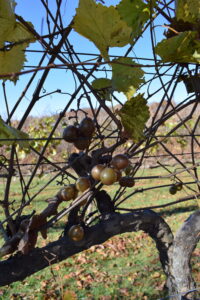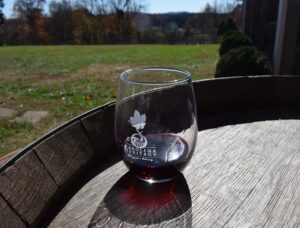Green Vines: Making Vineyards Sustainable
Megan Suggs
When Pat Colwell first saw the 35-acres in Yadkin Valley, brush and brambles covered the hills, concealing a house in the middle of the property. This abandoned family farm was the end of a year-long search for fields on which she and her husband Clyde could start a vineyard and winery.
Clyde wanted to start a vineyard post-retirement, despite the couple’s lack of agricultural experience. He had been a teacher, and she had retired from IBM. Pat wanted to make sure that she was serving the community and bettering the environment during her retirement.
“The only thing I could think of that would combine my desire to give back with his desire to have a vineyard was to go organic,” Pat said.
As the couple surveyed properties, the fields became indistinguishable. During the search, the Colwells consulted faculty at North Carolina State University who said local vineyards couldn’t be organic. The humidity encourages fungus growth, and pests like the Japanese Beetle strip vines of all their leaves.
Pat was skeptical. Before Europeans set foot in North Carolina, the muscadine grape flourished without assistance.
In 2005, the Colwells bought the abandoned farm, bush-hogged the weeds and wild blackberries dominating the land, and planted their first grape vines. In 2008, the U.S. Department of Agriculture certified their business, Carolina Heritage Vineyard and Winery, as organic. In 2021, the Colwells, with the help of hired laborers, harvested nine tons of grapes from five and a half acres. Half of those vines are muscadines, and the other half consists of six hybrids of American and European varieties. Having collected enough to make this year’s batches of wine, the couple left some grapes on the vines.
Picking the Right Grape
A row of several short grape vines in the Colwells’ front yard is the key to their environmentally- and economically-sustainable vineyard. Whenever the couple stumbles upon a wine that they enjoy, they plant a small vine to see if it can survive the hot, humid North Carolinian climate. If the small sample struggles, they don’t plant more in their vineyard.
Because they ensure that their vines can survive without chemical assistance, Pat said she’s confident Carolina Heritage can continue organic operations in the face of any weather shifts due to climate change in the foreseeable future.

Pat and Clyde Colwell harvested 9 tons of grapes from five and a half acres in 2021 without chemical fertilizers or pesticides.
Mark Hoffman, a small fruits specialist at the N.C. Cooperative Extension Office, said picking the right grape for the location is the best way for a vineyard to be sustainable. While demand may be high for wines from European grapes like Riesling, Chardonnay and Merlot, those vines will only be able to withstand the heat and humidity of the Southeast with chemical assistance.
Grape vines can live 20 to 40 years. Hoffman said vineyard owners should carefully research what types of grapes are suited to a property’s soil and climate. Not only do vineyard owners need to consider what their local climate is like now as they plant vines, but they need to think about what North Carolina’s weather will be decades from now.
Hardiness zones that determine what plants will thrive where are shifting north in response to climate change. Hoffman said grapes that already need chemical assistance in North Carolina will be unsustainable as the state’s average temperature rises. Not only will the application of pesticides, herbicides and fertilizers be harmful for the environment, the vine maintenance will cost too much for vineyards to make a profit.
Native and hybrid grape variants will be easier and cheaper to maintain. Hybrids of European and American grapes will be vital to a wine industry adapting to a warming climate.
“European genetics bring in the flavor, and American bring in the hardiness,” Hoffman said.
Weather patterns also affect a wine’s taste. In summer, there’s a smaller difference between North Carolina’s day and night temperatures than in Europe. Hoffman said temperature and evaporation have an impact on the grape’s acid and sugar levels. The warmer it is, the faster grapes ripen and the more sugar and less acidity there will be. In other words, a wine made from grapes grown in Europe will not taste the same as wine made from the same variety of grape grown in North Carolina.
Green Tourism
If North Carolina vineyards choose to implement sustainable practices, the state’s Department of Environmental Quality recognizes them through the NC Green Travel Program.
Carolina Heritage has earned the highest rating of environmental stewardship possible in the program. Pat Colwell, however, expressed some doubt that all “green” vineyards and wineries are actually using sustainable practices.
The program’s manager, Tom Rhodes, said a committee reviews all businesses wishing to be recognized. To apply, owners identify their sustainable practices. The committee awards points based on how much effort and investment the sustainable practice requires. Implementing green practices can be as easy as printing on both sides of a piece of paper in the office or as demanding as starting a wildlife refuge on the property or not using pesticides.
On a sunny fall day, Carolina Heritage’s vines were almost completely bare, but the parking lot was full just an hour after opening. A large group of women bought a few samples to try together. A harpist and flutist set up in the corner, and a couple chatted while sipping their wine. Despite doubts shared by experts when the Colwells planted their vines, their dream of running a vineyard that nourished rather than depleted the land had come to be.
Starting sustainable practices can be expensive at first, but can save money long-term. Rhodes said ensuring pipes aren’t leaking or insulating a water heater saves resources that the business doesn’t have to pay for. “Green vineyards can save money, and they tend to attract more visitors,” Rhodes said. “Because people want to be green — and drunk.”
Pat and Clyde Colwell run an organic vineyard and winery in Yadkin Valley, NC.
